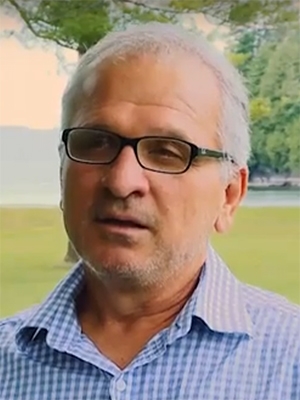Hector Vila
Associate Professor of Writing & Rhetoric

- Office
- Davis Family Library 224
- Tel
- (802) 443-2181
- hvila@middlebury.edu
- Office Hours
- Fall 25: Tuesday: 10 am - 11:30 am & Thursday: 2 pm - 3:30 pm
Professor Vila, an associate professor of Writing & Rhetoric, brings his extensive experience and expertise in experiential learning, student cohort-building, and academic inquiry into inequality to this role. His book, Life Affirming Acts, Education as Transformation in the Writing Classroom (Heinemann/Boynton-Cook) addresses the tension between race and gender, class, and the education system. Héctor’s book article, “Digital Stories in the Liberal Arts Environment: Educational Media Communities at the Margins,” with Barbara Ganley, inMedia Communities, Brigitte Hipfl, Theo Hug, ed.(Waxmann, Berlin and New York) demonstrates how digital media can break down harsh boundaries between students and education. Further essays on education, marginalization, and identity are published by the Community Works Journal. Of interest may be, Degrees of Separation: Helping Students Find Safe Spaces for Thinking and Being, Star Wars Civilization and Stone Age Emotions, Who Owns the Academic Body in the ‘Pandemic University’ , and Reflecting With Students. The Ecology of Teaching is an interview about service learning, particularly at Middlebury College.
Courses Taught
FYSE 1124
AI, Writing, and Creativity
Course Description
AI, Writing, and Creativity: The Imagination in the Digital Age
In this course we will explore the relationship between artificial intelligence, human writing, and creativity. Students will examine how AI systems like large language models are transforming creative expression while considering fundamental questions about imagination, authorship, and the nature of human creativity in the digital age.
Terms Taught
Requirements
WRPR 0101
Writing and Power
Course Description
Writing and Power
Power: who has it, who doesn’t, and what does it have to do with your writing? This course both instructs students in how to access power in academic contexts and to critique power structures. We’ll learn how power connects to literacy, and how it's shaped through rhetorical contexts. Students will explore their own power as writers and thinkers while engaging in meaningful personal, reflective and argumentative writing. The professor will work with each student extensively on their writing process and development, and we'll create a writing community. This course bears elective credit but does not fulfill the college writing requirement. 3 hrs. lect/disc (Students who have already taken WRPR 0101 cannot take this course again.)
Terms Taught
WRPR 0202
Upcoming
Writing To Heal
Course Description
Writing to Heal
This writing-intensive course examines writing as a catalyst for healing after loss or grief. In a workshop focused on student writing, we will analyze fiction, drama, poetry, and creative nonfiction as a basis for discussions. To this end, we will read creative non-fiction, memoir, and novels. Assignments for this course will include formal analytical essays, creative work (published online), and oral presentations.
Terms Taught
Requirements
WRPR 0203
The Rhetorics of Sports
Course Description
The Rhetorics of Sports
In this course we will examine the relationship between media, sports, and the formulation of one’s identity. We will examine issues pertaining to gender identification, violence, and hero worship. Reading critical essays on the subject, studying media coverage of sporting events, and writing short analytical essays will enable us to determine key elements concerning how sports are contextualized in American culture. Student essays will form the basis of a more in-depth inquiry that each student will then present, using media, at the end of the course. (Not open to students who have taken WRPR 1002)
Terms Taught
Requirements
WRPR 0323
Upcoming
The Rhetorics of Death
Course Description
The Rhetorics of Death
In this course we will examine a number of issues that arise once we begin to reflect on our mortality. Are we, in some sense, immortal? Would immortality be desirable? How should the knowledge that I am going to die affect the way I live my life? What is the place of grief? The goal of this course is to examine creative approaches to these questions in Literature and Philosophy. The purpose of this examination is to enable deep reflections on a meaningful life when understanding that there is an end to it. We will engage in discussions and share our writing as a means of understanding “the good life.” Student writing will emerge from discussions of course texts.
Terms Taught
Requirements
WRPR 0333
Writing on Contemporary Issues
Course Description
Writing On Contemporary Issues: Writing, Editing, and Publishing Online
This course is an introduction to writing prose for a public audience. Students will create both critical and personal essays that feature strong ideas and perspectives. The readings and writing will focus on American popular culture, broadly defined. Essays will critically engage elements of contemporary American popular culture via a vivid personal voice and presence. Readings will address current issues in popular culture – Gladwell, “Brain Candy,” Klosterman, “Campus Confidential,” for instance. ReMix: Reading in Contemporary Culture is the central text. The end result will be a new online magazine of writings on American popular culture 3 hrs. lect.
Terms Taught
Requirements
WRPR 0334
Writing and Experience
Course Description
Writing and Experience: Exploring Self in Society
The reading and online writing for this course will focus on what it means to construct a sense of self in relation to the larger social world of family and friends, education, media, work, and community. Readings will include nonfiction and fiction works by authors such as Maya Angelou, James Baldwin, Andre Dubus, Tim O'Brien, Flannery O'Connor, Amy Tan, Tobias Wolff, and Alice Walker. Students will explore the craft of storytelling and the multiple ways in which one can employ the tools of fiction in crafting creative nonfiction and fiction narratives for a new online magazine on American popular culture. This magazine will have been created by students in Writing on Contemporary Issues. Narratives about self and society will therefore lean towards aspects of American popular culture. 3 hrs sem.
Terms Taught
Requirements
WRPR 0500
Current
Upcoming
Independent Research
Course Description
Independent Research
(Approval Required)
Terms Taught
